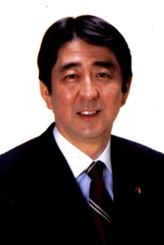TOKYO -- Japanese Prime Minister Shinzo Abe may not have had his predecessor's flare for politics, or been able to match what came to be known as "Koizumi theater," but he sure knows how to make a dramatic exit. Abe stunned most political observers, and many members of his own party, by abruptly announcing his intention to resign Wednesday, leaving the ruling Liberal Democratic Party (LDP) scrambling to find a successor. The next day he was checked into hospital suffering from exhaustion. In many respects the decision to step down is not surprising -- Abe's party took a pummeling in Diet upper house elections in July, and his administration has been wracked by a series of financial scandals and verbal gaffes. A cabinet reshuffle last month, which saw the injection of several seasoned LDP operators, was supposed to steady the ship. Yet approval ratings for Abe's cabinet remained stuck below 30 percent and it was not long before another minister was embroiled in controversy.
After Abe, Japan’s Opposition Should Seek Compromise on Antiterrorism Legislation

